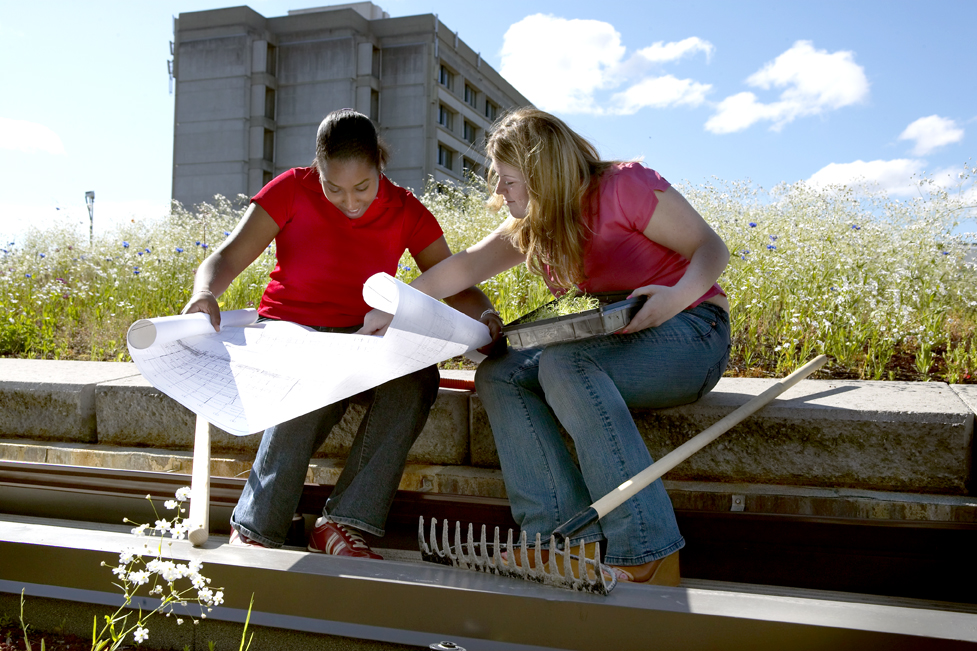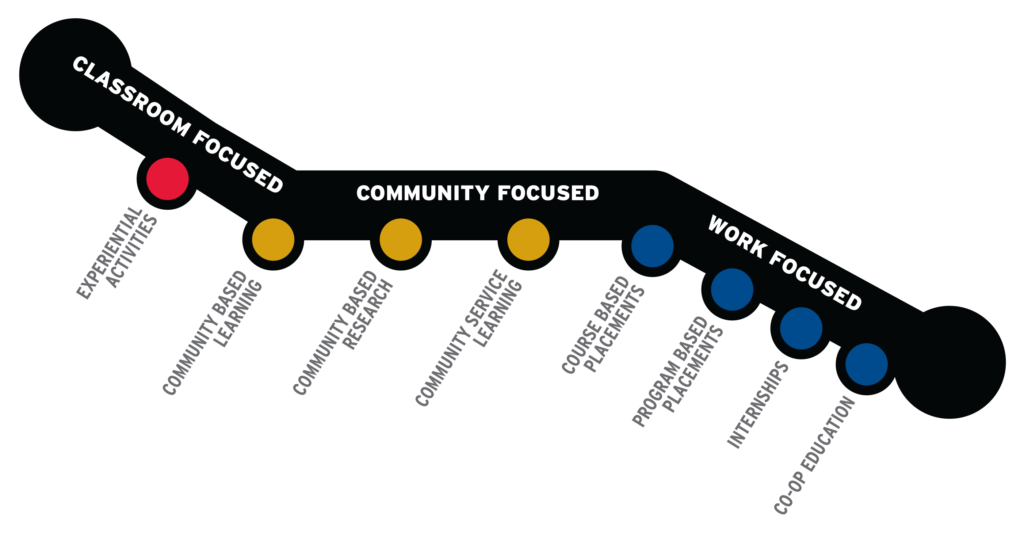This guide provides an introduction to the various types of EE that are embedded within courses or programs at York University. We aim to provide a systematic way of categorizing these experiences with a corresponding EE course code. Faculty members who currently incorporate EE into their courses, or who are planning to do so in the future, will have a local point of contact (e.g., EE coordinator, UPD or GPD, Chair) to inform their school/department/unit when course assignments or decisions about future course offerings are made within the unit.

Experiential Education (EE) is the application of theory to a concrete experience, either within the classroom, within the community or within the workplace, in a manner that advances the learning outcomes of a course or program. It requires students to reflect upon their learning.
York University’s Experiential Education Common Language document outlines the range of EE that has been integrated within courses and programs at York University.
The diagram below highlights the three broad foci or EE types.

Classroom Focused
Practices, activities, and/or assignments that extend, apply, and allow for the reflection on students’ course-based learning through experiences and situations they may encounter inside or outside of the classroom.
Community Focused
Students learn from engaging with community members and/or organizations through a specific project undertaken outside and/or inside the classroom.
Work Focused
Placements, internships, and co-op opportunities that extend, apply, and allow for the reflection on students’ course or program-based learning through their work in the field or with an organization such as a business, non-profit, school or agency.
Please consult the EE Common Language document for the detailed definitions of the different kinds of EE within classroom focused, community focused or work focused EE types.
Keeping it R.E.A.L.: Ensuring that the EE focus is on student learning
Experiential Education (EE) is more than a series of experiences and associated reflection. Rather, they are designed to advance at least one course or program outcome. As such, some form of assessment helps track students’ progress in attaining the learning outcome(s) and provides them with valuable feedback. Regardless of whether EE takes place in the classroom, community or workplace, to ensure the focus of EE is on student learning, a useful acronym is R.E. A. L. which stands for the elements of:
Reflection
- Reflective prompts or activities are weaved in before, during and after the experience
Experience
- A purposeful and authentic experience brings new meaning to the learning process
Assessment
- The learning that takes place as a result of the EE component can be demonstrated and assessed in some way
- The EE component is explicitly incorporated into the assessment plan (or grading scheme)
Learning
- The EE component is explicitly aligned with at least one course or program learning outcome
Part 1. Designing an EE course: Where to start
EE can occur within the classroom, community or workplace. The Teaching Commons offers workshops, courses and programs and curated online resources pertaining to EE and its incorporation into teaching practice. Topics cover:
- Course design
- Identifying learning outcomes
- Options for learning activities
- Building sustainable partnerships (pedagogical perspective)
- Assessment and evaluation
EE Workshops, courses and programs are open to all course directors who teach at York University (including contract faculty). For more information please visit the Teaching Commons at:
https://teachingcommons.yorku.ca/for-cds/workshops-and-courses-for-cds/
For online resources curated by the Teaching Commons, please refer to:
https://teachingcommons.yorku.ca/resources/experiential-education/ To learn more, or to book an individual consultation, please contact the Teaching Commons directly: teaching@yorku.ca.
Part 2. Partnership development and EE Logistics: Practical Aspects
When planning for the implementation of community focused EE or work focused EE we encourage course directors to work with their Faculty-based EE coordinator or in some cases the the office of the Vice-Provost Teaching & Learning.
Faculty-based EE coordinators provide:
- Local support for partnership development. This includes locating discipline related partnership opportunities etc.
- Logistic support (in terms of appropriate risk management/insurance forms, or implementation support)
- A link between partner organizations and the course director
- Each year York university offers a broad range of EE opportunities within its courses and programs.
- Students need a way of identifying these EE opportunities when they choose their courses.
- The EE Course Coding Guide provides a systematic way of categorizing EE experiences with a corresponding EE course code.
- As part of the course coding process faculty members who currently incorporate EE into their courses, or are planning to do so in the future, will have a local point of contact (e.g., UPD/GPD or Chair) to inform their school/department/unit, when course assignments or decisions about future course offerings are made within the unit.
- Normally course coding occurs one year prior to the course offering so that it can appear in the lecture schedule for the upcoming academic year.
- Review the EE Guide to Course Coding.
- Decide what type of EE course is being offered
- Inform the local contact: (The local contact will vary: It could be the UPD/GPD or Chair) Note this must be done in the year prior to the course offering, so that it can be mounted on the course offering system for the upcoming academic year.
The Teaching Commons provides support and professional development to faculty members on effective pedagogy and good practice, developing course learning outcomes and using experiential education strategies to enhance learning. The programing offered by the Teaching Commons is open to all course directors. Through engagement with workshop material participants will be able to develop a design for the delivery and evaluation of a course with an EE component. No experience of developing EE is required, but participants may prefer to choose to work with a course they are already experienced in teaching
Additional resources and examples can be found on the Teaching Commons website
https://teachingcommons.yorku.ca/resources/experiential-education/
To learn more, or to book an individual consultation, please contact the Teaching Commons directly: teaching@yorku.ca.
Faculty-based EE Coordinators
Faculty-based EE coordinators provide local logistical support to course directors (CDs). They are a discipline specific resource that can facilitate partnership development. EE coordinators work collaboratively with partner organizations and CDs in terms of creating EE opportunities that are connected with courses and programs. They can also serve as a liaison with the partner organization and the CD.
